#at least some of them don't have a lot of baggage/trauma that needs healing
Explore tagged Tumblr posts
Note
same anon. I actually meant cc Donnie specifically. forgot to specify, lol. I guess I just assumed you were talking about him with those headcanons even though you have two other au's.
Anyway, I thought that you were leaving the idea open for an interesting narrative. And it would give me room to explore cc!Donnie's healing ark more in the way that I wanted when I first finished hunger games. I could project katniss everdeen's trauma onto him, lol. Like, him having a kid/kids super far in the future despite everything, after he finally feels safe enough to do so, like katniss... don't know. It just makes me whimsical and mischievous thinking about the potential...
yeah i get it! tbf most of these headcanons could be applicable to cc!donnie as well because he was just. regular canon donnie for most of the established rise timeline. he experienced everything before battle nexus new york (and possibly clothes dont make the turtle? mentioned that itd make sense if it never happened otherwise there'd be an accidental plothole, so he is DEFINITELY getting to have that adventure post-trauma god dammit he NEEDS THIS), with some obvious liberties/things that pop up specifically to cement the themes of cc that probably wont be there in future projects (rooftop conversations, the spreadsheet, the specific effect that many unhappy returns had on him, etc etc, although you can steal these things for your own projects if you think they work particularly well. painkiller thing always remains consistent in all of my work though)
i dont find romance absolutely necessary for him in the future (and im nooot sure about the idea of him having kids? mostly because he's spent his whole life quietly taking care of people already,,, he might be best as a very close uncle, or maybe he would just have his family pitch in a lot,,, parenting usually requires this idea that you have to completely give yourself up to take care of another person and to always put them first, and with donnie that's ... yknow, already what he's been doing and should probably stop doing LOL)-- although on a more general note i think him finding outside connections with people that dont have so much baggage with him is important, and romance can easily be boxed into that.
i just think with the standards for romance to be The Most Important Relationship In Your Life it would create some unrest in his family, because that's a big deal and ngl i see donnie as a very romantic person (although i do like him being aro in some universes). i dont think they'd be immediately disapproving or overbearing (to his face, at least) but i think they would worry and probably take a while to warm up to his partner unless they knew them for a substantial amount of time first. i dont think donnie would keep it hidden from them, but he'd still be very private about it, which would worry them.
i cant see them being envious, but they would be very suspicious. there's comedic potential and there's angst potential with the idea so its a nice double-edged sword lmao.
15 notes
·
View notes
Note
Why in Helluva Boss and Hazbin Hotel Stolitz seems to be the ONLY relationship with power imbalance that is not faring well?
Ozzie and Fizz - We don't even know if they have a romantic relationship, but they just work. They even can communicate with glances and both feel secure with their respective positions while openly showing they at least respect and at some point care for each other.
Charlie and Vaggie - The girls are very loving towards each other, Vaggie does her best wanting to support and protect her girlfriend and Charlie does her best to listen to Vaggie (even though she not always seems to do so) and let her feel she appreciates her.
And now Bee and Tex - They seem to be open with and trust each other, both being able to communicate properly when needed as they share interest in both partying and making sure the ones around them are ok.
Literally the only unbalanced relationship that that is as bad (in this case worst) than Stolitz are Valentino and Angel Dust, which doesn't count since we know they don't care for each other, it's just sex business. But like.... bruh.

Okay I'm skipping a few asks but I just want to get this done. I have seen this take go around since Queen Bee came out so I guess now is the time I give my two cents on it. In my humble opionion the short answer is trauma but long answer. Well let me cover all the other relationships you mention and tell you that it's far from a one to one comparison.
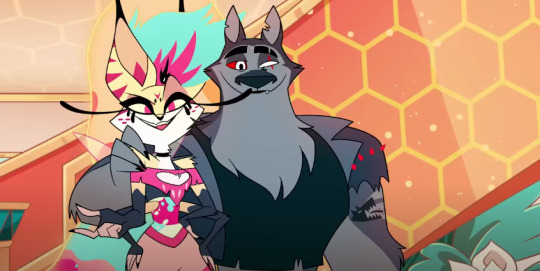
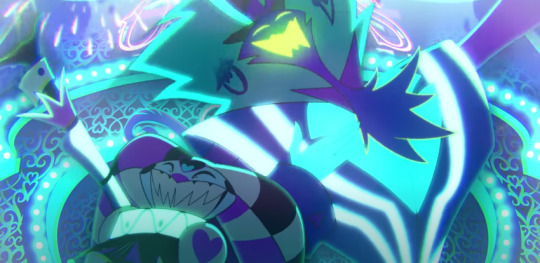
Bee and Tex, and Asmodeus and Fizz have the same very big thing to consider. That one is literally one of THE deadly sins, only Lucifer could rival there power and that's up for debate. Either way pratically noone can tell these guys what to do, who to date or how to feel. That is not a luxury Stolas and Blitz have. They have never had any protection from the system that is harmful to both of them, while Bee and Ozz are pratically above that system, and thus can protect their partners from it.
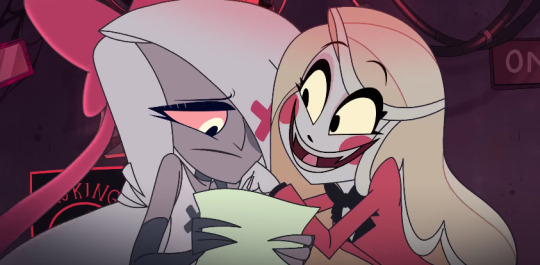
Charlie and Vaggie are a bit closer despite Charlie also being above the Goetias. But the one difference lies mainly in Charlie (We don't know much about Vaggie, sorry queen) Charlie, has left her toxic home life, she is still scarred from it, we know she is but she has left it and she is healing and trying her best. There aren't really any pressures weighing on them aside from the Hotel which is something they do together. Any problems they face are external to their relationship, not internal.
Stolas and Blitz on the other hand, man these two are pratically being crushed by the pressure on them.

Stolas is literally going through a divorce out of an abusive relationship while wanting to keep his daughter happy, AND fix his situation with Blitz which he was trying to do before, you know he was fucking kidnapped. So he's going through a divorce that is actively getting held back by the other side, managing parenting a child during that while also trying to fix his mistakes. Not to mention the truckload of trauma he must have from both Paimon and Stella.
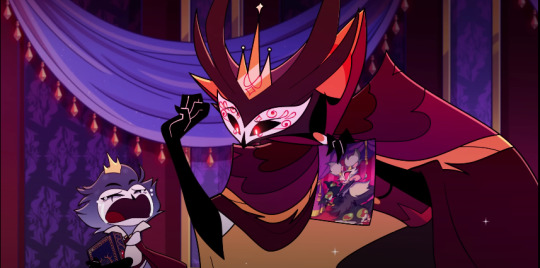
Also let's be honest, noone fucking taught him how to manage a ACTUAL romantic relationship. He's like 36 and was locked in aforementioned abusive marriage for most of that. He's learning, and that's messy more often then not. Some first real partners are able to teach you and help you well enough, but Blitz has his own baggage, and he doesn't even recognize the relationship as anything other then sexual so he doesn't see the need even.
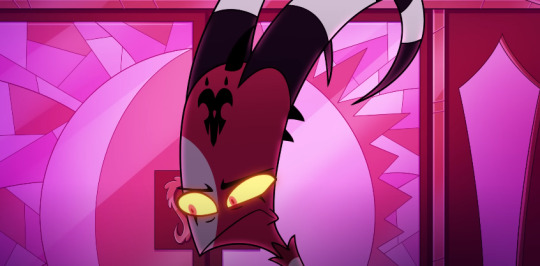
Blitz has, so many problems emotionally but also just, he doesn't recognize what he and Stolas have as a relationship. You cannot work on something you do not know is there after all. He has had awful expirience with love making him very closed off and filled with unhealthy coping mechanisms. Not to mention all the buisness that just, isn't related to Stolas.
You can have a lot going on but still have a relationship, but again, Blitz doesn't see it as one. He gets the book, that is all that he agknowledges that matters so far. Cause admitting that Stolas matters to him, that he wants him, that he wants to have a loving relationship with him specifically. Is terrifying to him.
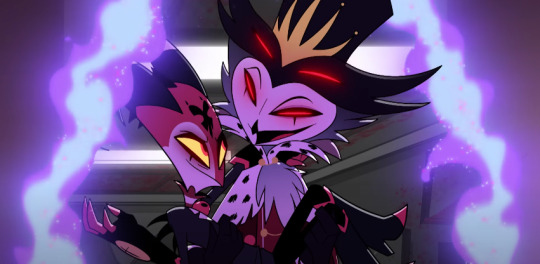
Honestly I get the comparison on a surface level. Royal and lower class demon, I get the concept. But these are VERY different characters at the end of the day, so they are going to have different problems.
Blitz has had too many bad relationships, while Stolas has had none good, so these traumas and traits clash. I still ship them wholeheartedly, don't get me wrong but what I mean to say is that with the surrounding circumstances, there past experiences, these problems honestly make a lot of sense if you think about it specifically.
I Ship all these ships mind you, just throwing in my two cents as previously mentioned.
#ask reply#helluva boss#blitzo#stolas goetia#stolitz#character analysis#helluva beelzebub#helluva vortex#helluva asmodeus#fizzarolli#chaggie#these boys have trauma to spare and I just don't get how you expect things to be smooth working those out honestly
139 notes
·
View notes
Text
The manly urge to just give your OCs cuddles and a happy ending but you are a responsible parent that has yet to write their story and character arc so you stand strong and resist
#ramble#at least some of them don't have a lot of baggage/trauma that needs healing#shout out to frosted sugar key lime pie mochi and bubble gum for keeping my sanity#shout out to gouda for having a little baggage yet still having a pretty easy story#*looks over to the rest of my children and sighs*
3 notes
·
View notes
Text
Boston Burning Part One
Pressure
Summary: After the ceiling caves in leaving Nika Stan trapped and injured on an emergency call, she's ordered to take mandatory sick leave until her injuries heal. She can think of no better place to rest and recuperate than in Boston with her (and her brother's) best friend.
Warnings: very minor description of injuries
Word Count: 1459
A/N: Here's chapter one of part one of my two-part crossover series! For a setup chapter, I personally think it sucks a bit. But I hope you like it. This story was born of my love for firefighters, my need for d/Deaf representation, and dreams no one needs to know about but that I told one of my best friends of anyway (hehe). Happy reading!
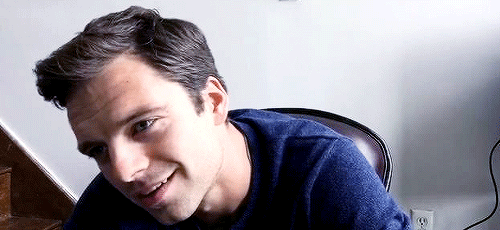
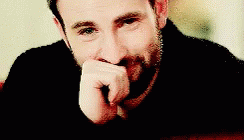
New York born and raised, Nika Stan had always been her big brother's little shadow.
When 13-year-old Sebastian loudly declared one warm evening at the dinner table that he was going to grow up and be a firefighter like the one he'd seen on the way to school, a chubby-cheeked 4-year-old Nika proudly echoed, "Me, too!" And when her big brother leaned over with his dark ocean blue eyes to kiss her forehead and whispered gently in her ear, "Of course, you will, my little Sunspot!" Nika knew then that she was born for greatness.
For Nika, that greatness took the form of many things throughout her life; from saving kittens stuck in trees and helping her neighbor Mrs. Jenkins across the street after school, to following in her brother's footsteps all the way to the National Fire Academy. Sebastian always taught Nika that she could do and be anything she put her mind to, he was her number one fan and biggest supporter. Whenever she needed a little extra encouragement, he was right there to give it to her. Likewise, Nika did the same for him.
The call that changed their lives came just after 2 AM.
Sebastian was out of bed, dressed, in the car, and walking through the doors of Brooklyn General within the hour. It was late, the emergency room was empty save for the Squad, Engine, and Truck members huddled in the far corner of the waiting area. Before he could make his way to the reception desk to inquire about his sister's whereabouts, the Squad Lieutenant intercepted him.
"Hey, man. They're treating her now and Brooklyn PD is taking her statement. Chief's with her, but she's been asking for you. Straight back, first room on the left."
"Thanks. All of you, for being here. I'll update you when I know more."
The whitewashed walls of Brooklyn General were never Sebastian's thing; he belonged on the outside, keeping people from having to enter its doors. Now, though, he carefully wandered its hallways looking and listening for the one person he never wanted to see taking up residence in the massive building — Nika. The Chief had assured him that her injuries were minor but he wouldn't believe it until he could see her with his own eyes. He continued down the hall to the first door on his left, and knocked before heading in.
To Sebastian's surprise — and the credit of the doctors on call late that night — Nika didn't look too worse for wear. He breathed a sigh of relief and acknowledged Chief Jackson briefly, before he settled in the chair at Nika's bedside.
"Frate mai mare," she greeted softly. She looked up at him with glazed honey-colored eyes, no doubt a result of the mild sedative they'd given her to help with the pain. White gauze poked out from under the right shoulder of the clean hospital gown she wore, her wrist had been placed in a hard cast and propped up on a pillow in her lap. She looked so tiny beneath the blankets.
"Sora mai mică," Sebastian answered in kind. He gently pushed a hand through Nika's hair. watching closely as her eyes fluttered shut at the comforting contact. Once he was certain she'd fallen asleep, he turned to address the other men in the room. "Did she say what happened?"
"She was clearing the top floor, called out and received no response. When she turned to leave, the owner ambushed her from the next room. The ceiling came down on top of them," Chief Jackson told Sebastian calmly. "The only thing she remembers after that is waking up here."
Dr. Fuller handed Sebastian a copy of Nika's x-ray. He hated this part, they all did. Everyone loved the younger Stan sibling as much as Sebastian did, seeing her in any sort of discomfort put them all on edge. "She's got a broken radius and second degree burns on her shoulder and across part of her chest. We'll keep her overnight for observation, just as a precaution. She can go home tomorrow afternoon but it's in her best interest to keep her off duty until her wounds heal."
Sebastian chuckled. "She's not going to like that. Thanks, Doc, I appreciate it."
"Unfortunately, the owner of the house fled the scene before we got there. But from what Nika and a few of the guys were able to give us, we have enough for a rough sketch. I'll keep you updated when we have more information, Seb. We'll find out who did this." Detective Brighton firmly clapped Sebastian on the shoulder before following the doctor and chief from the room, leaving the siblings alone.
Nika slept soundly for three days which the doctors assured Sebastian was normal for the small amount of trauma her body had endured. On the fourth day, he was growing increasingly concerned for his sister's well-being. As he weighed the pros and cons of waiting it out against going to ask Dr. Fuller to recheck Nika's vitals, Sebastian paced back and forth at the foot of her bed.
"Bas, you're going to wear a hole in the floor," Nika said. Her voice sounded rough and scratchy from sleep, but at least she was talking.
Sebastian sighed, relieved. His fingers curled around the two small devices in his right jacket pocket, she wouldn't be able to hear him without them but maybe that was for the best right now. He withdrew his hands from the comfort of his jacket pockets, stood at the foot of Nika's hospital bed and braced himself for the flood of emotion and attitude that would soon pour from his sister like rolling thunder.
"Hey, Sunspot. Glad to see you're awake," Sebastian moved his hands with such a calm fluidity when he signed. He'd learned for Nika when no one else would, it often made moments like this a lot easier for them. "How do you feel?"
"My chest is sore, but it's not too bad. Ready to get the hell out of here, honestly. Hospitals wig me out."
"You're good to go today, but you're out of work until your wrist and burns heal."
Nika rolled her eyes and scoffed indignantly at her brother's instruction. Not working wasn't something she knew how to do, firefighting was in her veins. She sighed.
Sebastian chuckled. "Look, Nik, I know you don't want to hear this. But you need to take some time off, to rest, to heal. Do it for me. Please?" He knew he had her with those last five words; Nika would do anything for her brother.

Two days later, Nika stepped off the plane at Boston Logan International Airport.
She walked through the gate with the crowd, happy to be in a place where her brother wasn't for the time being. She loved Sebastian, loved that he wanted to protect her, but his concern lately had been stifling. Nika needed a break, needed a change of scene. As soon as they'd left the hospital, she called Chris and told him what happened. Without a second thought, he told her to come to Boston, said he'd be there when she landed.
She waded through the sea of people heading for baggage claim, keeping an eye out for Chris's tall frame. She was tired, sore, and just wanted to be somewhere she could relax without thinking of the accident for a while. She needed to take her medication, the dressing on her shoulder and chest needed to be changed, and she desperately needed a drink.
"C'mon, Evans. Where the hell are you?" Nika was just about to break down and call him, when she felt a strong hand wrap around her waist from behind.
"Hasn't anyone ever told you not to stand around by yourself in an airport?" Chris's smooth Boston accent said in her left ear. He had her backpack slung over his shoulder and her rolling suitcase in his hand. His bright blue eyes sparkled as he smiled down at her. "Ready to go?"
She nodded, signed back, "Ready for the pressure to stop. Thanks for letting me stay with you for a few weeks."
Chris grabbed her hand and gave it a gentle squeeze, then kissed the top of her head. His voice met her ear once again. "Ah, Nik. What are best friends for, huh?"
Nika hummed. She missed her brother, but she knew she'd be safe with Chris, too. Being out of the game wasn't going to be easy for the youngest Stan sibling, she was used to the fast pace of firefighting; she counted on it as much as she counted on her brother to have her back. Without it, Nika wasn't sure who she was or who she could be.
Till The End of All Things Taglist: @arrowsandmixtapes @pinknerdpanda
18 notes
·
View notes
Note
I saw your post about how Xianity is not essential to Judaism and and I don't want to derail it it but one particular thing really struck me while reading it; the concept of teshuva compared to Xian forgiveness, particularly how those differences really reflect how I've seen both religious cultures (???) handle person-to-person forgiveness. Judaism (at least from what I've seen) has actual steps for apologising, and they're all really good common-sense rules like 'don't do it again'. (1/3)
(cont.) The burden is on the offender to make things right, they’re the active party. In contrast, in Xianity you don’t have to do anything to make it up to the person you hurt. In fact, in Xian communities there’s usually a burden on the /hurt/ party to forgive and it’s seen as really cruel and a sign of moral weakness that you won’t let them feel better about what they did, even (sometimes /especially/) when they’re not sorry and intend to keep hurting you. (2/3)
(cont.) To me these two things feel like extensions of the attitude towards divine forgiveness and repentance. In Xianity receiving forgiveness feels like a very passive thing that’s all centred on your own guilt, your own inherent sin, and an attitude of ‘I said sorry so my hands are clean and now you have to make it up to me for making me feel bad for what I did’, etc. Judaism, on the other hand, seems to take a very pro-active, balanced approach of doing better for yourself and others. (3/3)
Hi Sarahsyna,
The differences between xian and Jewish understandings of what forgiveness is and how we should go about it are interesting, no?
I would say this is a pretty accurate analysis of the differences and where they come from. However, I would like to expand on this and add a bit of nuance to it, if I may.
There are different levels and types of wrongs to be forgiven, and the responses to them should be different.
Wrongs that are relatively minor, are fixable, and/or that are relatively common amongst otherwise decent people;
Wrongs that major, unfixable, and/or that are criminal/violent in nature;
Wrongs committed against oneself
Wrongs committed against others (usually in your sphere of influence, such as to your family members, but not necessarily)
In my experience, Judaism does a much better job of making these distinctions than xianity.
Minor Wrongs vs. Major Wrongs
Xian forgiveness is really appropriate for minor wrongs (with proportionately minor consequences.) Things like: someone took your lunch once, which creates an annoying but temporary problem. We shouldn’t sweat the small stuff, and as frustrating as that situation is, it’s not worth holding a grudge against someone forever because of a dumb prank.
Judaism similarly holds that we shouldn’t hang onto a grudge over this, and encourages people to let it go. Give the offender ample chance to apologize, but if they don’t, don’t waste your energy being mad at them. (Have you forgiven them? No. Should you still move on with your life? Yes.)
Of course, if by taking your lunch, they caused you to be unable to take a vital medicine, which consequently put you in the hospital, it should change the equation, no?
In xianity as I experienced it (**please insert that caveat throughout this discussion), it actually doesn’t change the equation. The intent of the offender was a dumb prank and so the forgiveness should be equally straightforward, even if the consequences to you are more severe than that person realized they would be when they did it. You should try to put yourself in the prankster’s shoes and imagine how awful you’d feel and how badly you’d want to be forgiven if it were you.
In Judaism, that person would need to do a lot more to make it right before asking for forgiveness. That might involve helping you pay your hospital bills, picking up your slack at work and/or otherwise trying to help in concrete ways because while their intent was minor, the effect on you was major. They must cope with that reality in the same way that you must. Might their intent factor into how inclined you are to forgive them afterwards? Sure! But they need to show that they realize how serious the consequences of their actions are and seek to remedy it first.
Fixable vs. Unfixable Wrongs
The consequences of some wrongs are fixable to varying degrees; others are not. If you take five dollars from my bag and then feel bad about it an hour later and put the money back? You’ve totally rectified the situation.
On the other extreme? While I have put in many, many hours of therapy and self-reflection and healing and therefore have gotten it under control, I will never not have trauma from having been raped and abused. Even if the perps spent the rest of their lives truly regretting what they did and doing hard work on behalf of survivors, they could never undo the damage they caused, even if they subsequently changed their behavior 180 degrees. (Editorial note: unsurprisingly, none of them have actually done any of that.)
Growing up, I felt an unbearable need to magnanimously forgive the perp despite his refusal to admit to what he did or apologize, and even as a culturally xian adult, I still felt a compulsory need to forgive subsequent offenders at least for my own sake in order to move on.
Judaism relieved me of any responsibility to forgive any of them, ever, because they have never apologized. I’m not even allowed to forgive them since they’ve never asked for it, but I don’t have to do so in order to heal because nothing they could do could heal me anyway. Them apologizing wouldn’t change the reality of their acts and me forgiving them wouldn’t change their future behavior. My healing is (for better or worse) my problem, and their becoming better people is their problem.
In a better world where they did hold themselves accountable? That would be stellar, but even in that world my remedy comes from the peace of mind in knowing that they aren’t hurting other people, from them still staying the hell away from me, and the justice in knowing that they have to live with what they did and are truly reckoning with it.
As a side note, it’s worth noting that this is why lashon hara is compared to murder by the rabbis. Lashon hara literally means “evil speech,” but refers to true statements that did not need to be made for any serious purpose and are malicious in nature. As an example, ��Alex has gotten really overweight this year, huh?” might strictly speaking be true, but is nevertheless clearly intended to be mean and gossipy. Why is lashon hara taken so seriously? Because you can’t put that toothpaste back in the tube. You can’t unring that bell. Once those words have left your lips, they’re out there, forever. You can apologize, but you can’t unsay what you already said.
Grace vs. Accountability
Ultimately, I believe that the foundational difference between how xianity approaches forgiveness and how Judaism approaches forgiveness are how it is defined in each.
In xianity, forgiveness flows, as you said from the idea that humans were forgiven for our sins by Jesus on his own initiative, and therefore we should replicate that kind of forgiveness in our own lives. Sin is inevitable, and the work of repairing it can be done by the person who was wronged, the same way that Jesus repaired humanity’s relationship with God through his sacrifice. This creates a model that centers grace given by the wronged person. Deservingness on the part of the wrongdoer does not factor into the equation.
At its best, this gives the person who was wronged the agency to address the problem themselves without waiting around for the wrongdoer to get it together. It has the potential to allow people with pain to let go of that pain. At its worst, it creates a system where victims are pressured (by their communities, spiritual leaders, and/or themselves) to forgive at great cost to themselves with zero accountability on the part of the offender.
However.
That assumes, as a baseline, that forgiveness is a prerequisite to moving on with your life. In the same way that forgiveness by God/salvation is a prerequisite to eternal life in xianity, so too is forgiveness between individuals a prerequisite to living the rest of your life without that baggage.
Judaism makes no such assumption. In fact, it comes to rather the opposite conclusion: forgiveness may be necessary for the wrongdoer to move on, but you, the wronged person, should feel no need to provide it unless and until the person has actually rectified the situation and asked for forgiveness. (And even under those circumstances, while forgiving is the morally correct thing to do, you aren’t always actually obligated to do so.)
Judaism operates on an accountability model that says that if you harm another person, it’s on you to fix it to that person’s satisfaction. If you are harmed by another person, you should do whatever you need to in order to move forward, but you don’t have to say that they’ve met their burden unless and until they actually do. In this view, forgiveness is not defined as grace, but rather as recognition that the person has actually held themselves accountable for their actions.
This, too, flows from a theological perspective: G-d expects us to constantly be striving to better ourselves, which we can only do by holding ourselves fully accountable for our actions. We are moral creatures, capable of making an active choice between good and evil. While mistakes are inevitable, we elevate ourselves spiritually, not by the grace of G-d or others, but by evaluating and reflecting on our own behavior and then taking active steps towards long-lasting change.
All of that, however, refers to direct wrongs between the wrongdoer and the wronged. I would be extremely remiss if I didn’t address … …
Wrongs Committed Against You vs. Wrongs Committed Against Others in Your Vicinity
One of the most serious problems I have with xian theology is the fact that the concept of grace doesn’t just apply between the wrongdoer and the wronged. It also applies between bystanders and the wronged.
Here is a great example of this:
Many of you may not know that one of my four children has Down syndrome. Her name is Bekah, and today she is 25. Bekah went to public school in elementary and middle school and was in normal classes and had lots of friends. Later, she attended college.
Many years ago, Bekah wanted to try out for cheer leading. My wife and I were amazed at how she learned the routines – jumping in the air, doing splits, and yelling out the cheers. Unfortunately, she did not make the team which was very disappointing for her and us. She had a really hard time understanding that she could no longer cheer with the other girls.
Soon afterwards, we received a letter from the coach explaining Bekah was not cut from the team because of her disability but because…she kicked, hit, yelled and cussed while in line with the other girls. We were stunned, no shocked, because Bekah had never exhibited any of those behaviors ever in any situation.
At a sleepover a few weeks later, which Bekah hosted in our home, several of the girls who had made the team asked my wife why Bekah had not made the team. My wife gently told them about the letter. They all immediately cried out, “Ms. Ellen, that’s not true at all. Bekah didn’t do any of those things. In fact, she did great in the tryouts.” Ellen called for me and asked me to come hear what the girls were saying. They repeated it all again.
This person had not only lied but had impugned Bekah’s character and we were angry! What had been done to our daughter was dastardly. The question afterwards was, “What are we going to do about this?” We knew we could not pull these girls into a dispute with this coach. So, we had no recourse. This coach had hurt a person who could not speak up for herself due to her disability and there was nothing we could do about it…except forgive.
Did this person deserve to be forgiven? Absolutely not. But we were not going to allow a root of bitterness to grow within us that Hebrews 12:15 warns about. We were not about to give this person power over our lives. We were not about to give Satan power over us. Was it easy? No! Everything in us cried out for justice but there was none to be had.
So, we trusted Christ in us, the greatest “forgiver” of all time, to live through us so we could forgive. We wanted to live like who we are in Christ, “forgivers”, in obedience from the love in our hearts for our Father. We wanted to “forgive one another just as God had forgiven us in Christ” (Ephesians 4:32) So, we sat before the Lord and poured out to Him our anger, our hurt, and our desire for justice. Then, because God had forgiven us for all our sins we did not deserve to be forgiven for, we forgave this person; meaning, we released the person from the debt we believe they owed us. In this case, the debt would have been an admission to us and especially to Bekah of the wrong they had done.
A few weeks later, would you believe that we saw this person at a church we were visiting? We were both so glad we had been honest with God about the hurts we received from the offense and then chose to forgive. We live free today from bitterness, resentment and unforgiveness. Praise God!
[Source: x]
Okay, so we don’t have time to unpack all of that, but just… sit with the fact, for a moment, that Bekah is utterly silenced by this approach. Did her parents have any right to forgive the coach? No, no they did not. That was Bekah’s right, and Bekah’s alone.
Compare that to what Rabbi Telushkin relays in his Code of Jewish Ethics:
”The differing attitudes of Jews and Christians on granting forgiveness for serious, particularly violent, crimes is reflected in an incident that Dr. Solomon Schimmel, a psychologist and a religious Jew, relates in his book, Wounds Not Healed, concerning a Christian woman who nursed back to life a man who had murdered her parents and raped her. The man, shocked by her behavior, asked the woman, “Why didn’t you kill me?” She replied, “I am a follower of him [i.e., Jesus] who says, ‘Love your enemy.’ “A remarkable story, but as Schimmel, writing from a Jewish perspective, asks, “Why, however, is it noble to love and take care of evil people?”
“In contrast to this woman’s attitude, when the Jewish writer Cynthia Ozick was asked if it was morally appropriate to forgive a penitent Nazi SS officer who had participated in the murder of a Jewish community in Poland, she responded: “‘I forgive you,’ we say to the child who has muddied the carpet, ‘but next time don’t do it again.’ Next time, she will leave the muddy boots outside the door; forgiveness, with its enlarging capacity, will have taught her. Forgiveness is an effective teacher. Meanwhile, the spots can be washed away. But murder is irrevocable. Murder is irreversible…. Even if forgiveness restrains one from perpetrating a new batch of corpses, will the last batch come alive again?…Forgiveness is pitiless. It forgets the victim. It cultivates sensitiveness toward the murderer at the price of insensitiveness toward the victim.”
“And what of the penitent SS officer? “Let the SS man die unshriven. Let him go to hell.”
“The Jewish view can be summed up as follows: Forgiveness is almost always a virtue, but the taking of an innocent life is an unforgivable offense.”
[Source: x]
29 notes
·
View notes